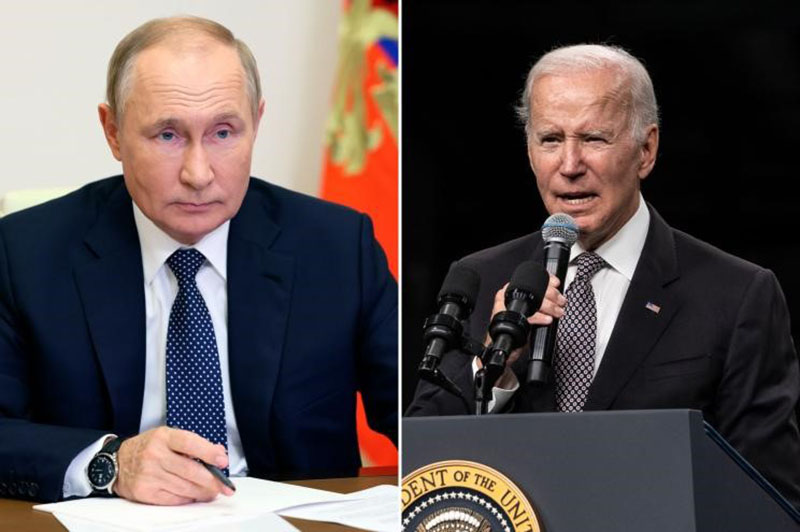NEW YORK/KYIV, (Reuters) – U.S. President Joe Biden said Russian President Vladimir Putin’s threat to use nuclear weapons is the biggest such threat since the Cuban Missile Crisis, as Russia’s military leadership faced a rare domestic public backlash over the war in Ukraine.
President Volodymyr Zelenskiy said Ukraine’s forces were swiftly recapturing more territory especially in the south of the country as Putin’s seven-month invasion unravels.
Biden said the United States was “trying to figure out” Putin’s off-ramp from the war, warning that the Russian leader was “not joking when he talks about potential use of tactical nuclear weapons or biological or chemical weapons, because his military is, you might say, is significantly underperforming”.
“For the first time since the Cuban Missile Crisis, we have a direct threat to the use of nuclear weapons, if in fact things continue down the path they’d been going,” Biden told Democratic donors in New York on Thursday.
“We have not faced the prospect of Armageddon since Kennedy and the Cuban missile crisis,” he said.
In the 1962 crisis, the United States under President John Kennedy and Soviet Union under its leader, Nikita Khrushchev, came close to the use of nuclear weapons over the presence of Soviet missiles in Cuba.
“I don’t think there’s any such thing as the ability to easily (use) a tactical nuclear weapon and not end up with Armageddon,” Biden said.
Putin, who marks his 70th birthday on Friday, has warned he would use all means necessary, including Russia’s nuclear arsenal, to protest Russian soil, which he now says includes four Ukrainian regions he annexed.
In remarks to Australia’s Lowy Institute, Zelenskiy said NATO should launch preventive strikes on Russia to preclude its use of nuclear weapons.
Kremlin spokesman Dmitry Peskov denounced the comments as “an appeal to start yet another world war with unpredictable, monstrous consequences”, according to RIA news agency.
Russia annexed Ukraine’s Donestk, Luhansk, Kherson and Zaporizhzhia regions, representing about 15% of the country, after holding what it called referendums – votes denounced by Kyiv and Western governments as illegal and coercive.
Since Europe’s biggest attempted annexation since World War Two, a Ukrainian counter-offensive has pushed Russian forces into further retreating and regained large parts of the southern Kherson region.
Zelenskiy said in a video address on Thursday that Kyiv’s forces recaptured more than 500 square kilometres (195 square miles) and dozens of settlements in Kherson in October.
“There are successes in the east as well. The day will surely come when we will report on successes in the Zaporizhzhia region (in southeastern Ukraine) as well, in those areas that the occupiers still control,” the president said.
Reuters could not independently verify battlefield accounts.
Ukrainian forces have regain control of thousands of square kilometres (miles) of territory since the beginning of September as the Russian front line has crumbled, first in the northeast, and, since the beginning of this week, also in the south.
In rare but growing public criticism of Russia’s top military officials, Kirill Stremousov, the deputy head of the Russian-backed administration in Kherson region, said the “generals and ministers” in Moscow failed to understand the problems on the front lines.
There was no immediate comment from Russia’s defence ministry.
Discontent has begun to bubble up among even loyalist state television commentators.
“Please explain to me what the general staff’s genius idea is now?” Vladimir Solovyov, one of the most prominent Russian talk show hosts, said on his livestream channel.
“Do you think time is on our side? They have hugely increased their amount of weapons,” he said of Ukrainian forces.
“But what have you done in that time?”
In the northeastern Kharkiv region where Ukrainian forces regained a large swathe of territory in September, the bodies of 534 civilians including 19 children were found after Russian troops left, police official Serhiy Bolvinov told a briefing.
The total included 447 bodies found in Izium. He also said that investigators had found evidence of 22 “torture rooms”. There was no immediate comment from Russia.
On Thursday, a regional governor said a missile demolished an apartment block and killed seven people in the city of Zaporizhzhia in the southern region of the same name, which Russia says it has annexed.
Eduard, a 49-year-old man who survived the attack, said he was woken at around 5 a.m. by a strong explosion. “The room filled with smoke and dust. I jumped up to go see what had happened,” he said.
In an online address to new security and energy co-operation forum the European Political Community, Zelenskiy accused Russia of targeting the same spot twice to kill responders.
“In Zaporizhzhia, after the first rocket strike today, when people came to pick apart the rubble, Russia conducted a second rocket strike. Absolute vileness, absolute evil.”
Russia says it does not deliberately target civilians.






